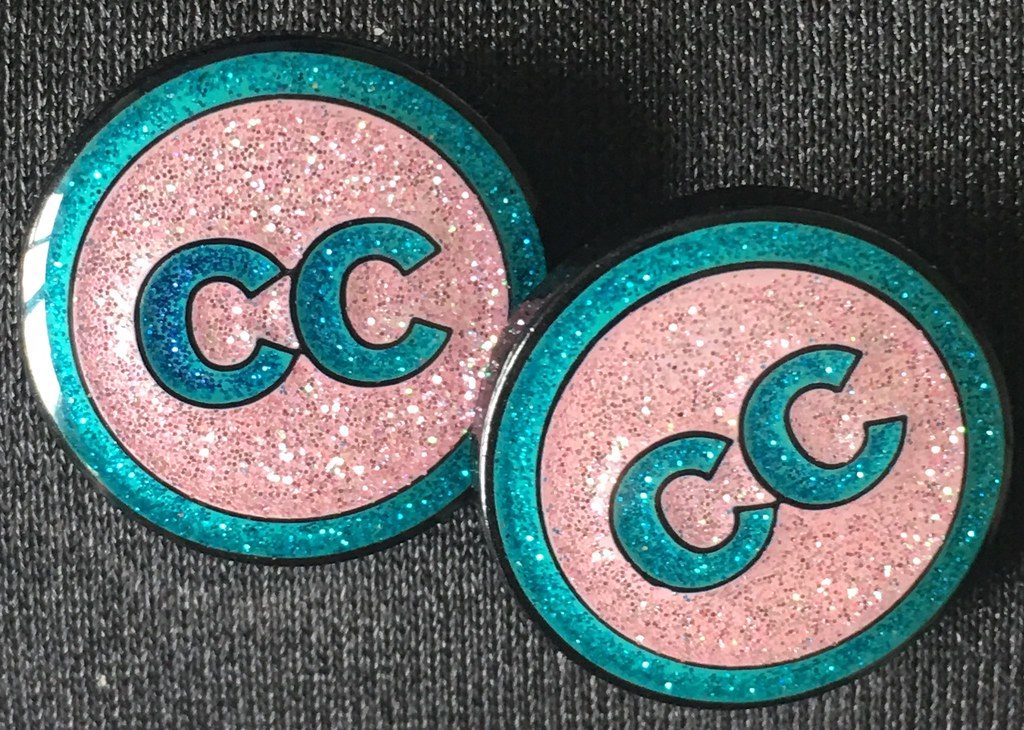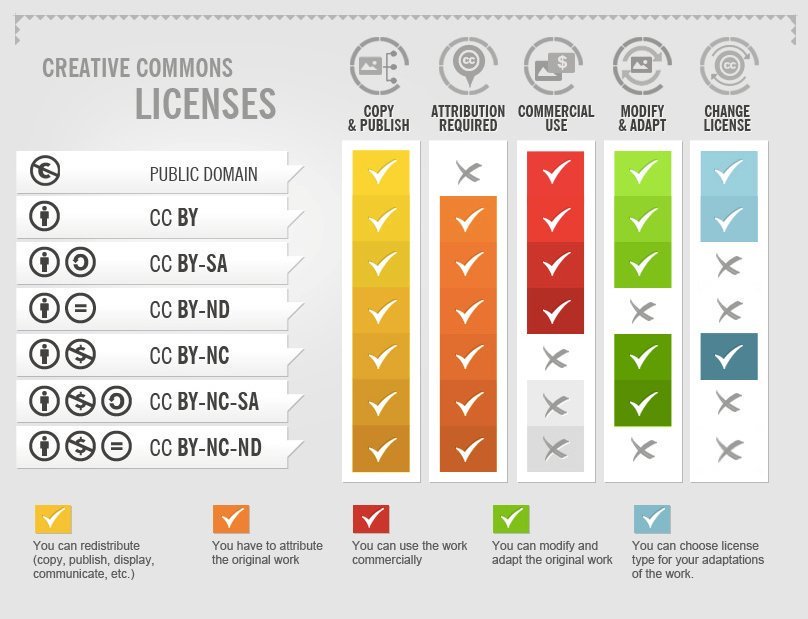The Evolution of Rebus Community’s Licensing Policy (REPOST)
Since the inception of Rebus, we’ve worked closely with the OER community to ensure that everything we do is informed by the values of the people we support. In addition, we aim to advocate for those values, build them into our tools and processes, and remain responsive to evolving attitudes and ideas as we all contribute to a vibrant ecosystem of OER creation. One way we undertook this advocacy role early on was through our approach to licensing, requiring all projects we worked with to release content under a Creative Commons Attribution (CC BY) license, as it is the most permissive, and most easily remixable CC license.

“CC lapel pins” by hj_dewaard is licensed under CC BY 2.0
However, our position has evolved over time, and we’re now pleased to welcome projects with a much wider range of licenses into our community and platform. The possibility for evolution on issues such as these is critical. Nothing is static in OER. We’re still too young a movement to settle on anything without challenging our beliefs and considering things from many angles. We have to accept and be comfortable with our responsibility to adapt once we realise there’s a better way to do things. Having been through this process ourselves, we wanted to share that story, and explain why we’ve come to view licensing differently than in our earliest days.
At our launch, we made a strong statement that we believed CC BY was the most permissive, and therefore best license for OER. Partly to comply with the conditions of our funding and partly in line with our own beliefs, we launched Rebus Community with a policy that all projects we supported needed to carry a CC BY license (read an archived version of this policy). This was reiterated last year when we launched the beta version of our platform, where there were no license options for users—everyone had to agree to CC BY to use the tool. We even joined forces with other important players in the community to release a joint statement advocating for CC BY as the best license for all to use.
At the time, we knew this position wasn’t shared by everybody, and certainly didn’t criticise or think less of anyone who used another license for any reason, but we did create a boundary around who or what could be a part of the Rebus Community.
In the time since, we’ve watched and listened and even facilitated conversations around the complexities of licensing, and, in line with our commitment to grow with the community, our thinking has evolved. We’re not the only ones who’ve changed our thinking, and here I want to credit those who have been pushing back on the CC BY orthodoxy for years.
There are many nuances to consider when it comes to licensing, and the point that has been made by many, including Maha Bali, Monica Brown, and the folks at Local Contexts, is that licensing should always be contextual. In short, the right license for a project can only be determined in context, and mandating any license limits creators’ ability to make the choice that works best for them and their audiences. Often, this contextualisation is important with regard to the level of risk assumed by the person granting a license. Those who are most at risk of suffering negative consequences from granting more permissive licenses are almost always those who are already most at risk and marginalised. Some of the clearest examples of this are in the cases of academics of colour, those working outside the “global north”, and those from and/or working with indigenous communities and traditional knowledge. The potential harm to these folks—that their openly licensed work will be reproduced without proper attribution, or that it won’t be recognised or rewarded within institutions, etc.—is greater than to others. So, by excluding them through our previous licensing policy, we were potentially limiting their participation in a community that they should have a critical voice in shaping.
In addition, we know there are many who are concerned by the increasing presence of for-profit actors in the community, and wish to use the Non Commercial (NC) condition to indicate that and preclude certain uses (e.g. placing open content within closed, proprietary platforms). While our position is that adding an NC condition does not prevent the uses many are concerned about, we’re also not the ones who should be making that decision for any individual creators. Our place is to support, inform, and guide them through the decision making process, but if their choice is that an NC condition is appropriate for them, that should not preclude them from engaging with and benefiting from the Rebus Community.
Finally, we also all have to contend with the legacy of existing content with more restrictive licenses that require adaptations and remixes to use the same. By limiting participation from projects seeking to build on, improve and maintain existing content with a range of licenses, we again risk shutting out a section of the community doing important work.
As a result of this shift in our thinking, we are now concretely changing our approach. We still believe that the most permissive license appropriate should be granted, and we believe that in most instances this is the CC BY license. But, we understand that the suite of licenses allow different people to make their own assessment of what is most appropriate. As a result, when we launch the next version of our software, users will be allowed to choose any of the following licenses:
- Creative Commons No Rights Reserved (CC0)
- Creative Commons Attribution (CC BY)
- Creative Commons Attribution Share-Alike (CC BY-SA)
- Creative Commons Attribution Non-Commercial (CC BY-NC)
- Creative Commons Attribution Non-Commercial Share-Alike (CC BY-NC-SA)
- CC I Don’t Know (CC IDK – our tongue-in-cheek addition for those who need more time to decide on a license)
You may notice that missing from this list are any of the No Derivatives (ND) licenses. At this stage, we maintain that the ability to exercise the 5Rs (retain, reuse, revise, remix and redistribute) is critical to the definition of OER. Anyone who does wish to create and release content with an ND condition may use any of our resources and participate in the community, but they will not be able to use the project tools on our platform for their ND content, and won’t be eligible to participate in a handful of our other initiatives. We haven’t made this omission without considering the consequences, but believe it continues to be an important part of our advocacy for OER best practices. Have no doubt, we will continue to keep a close eye on how attitudes, opinions, and values around the ND condition might continue to evolve, and make sure we’re evolving alongside it as necessary.
This is a conversation we aim to continue, so we invite any response to this change in policy that you wish to share. Incredible things are possible when we open up our processes and our content with open licenses, and we’re excited to see what’s to come as the Rebus Community expands.

Part of “How to Attribute Creative Commons Photos“, by foter, licensed CC-BY-SA 3.0
With thanks to Leigh Kinch-Pedrosa for editing and inspiration, because creation is always collaborative.